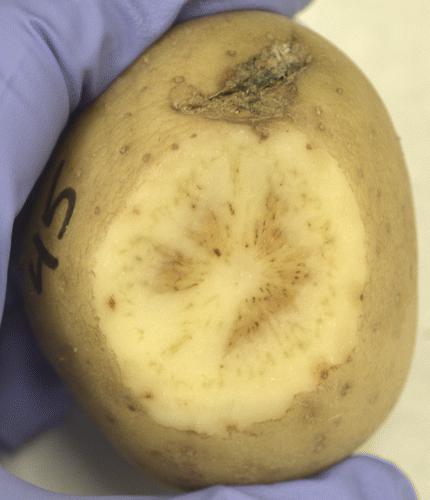
Credit: K. D. Swisher Grimm and S. F. Garczynski
St. Paul, MN (April 2019)–Named after the dark stripes that form inside potatoes after they are cut and fried, zebra chip disease is a potentially devastating affliction that can result in yield losses up to 100% for farmers.
The disease, caused by the bacterium ‘Candidatus Liberibacter solanacearum,’ has been economically damaging commercial crops, including potato, tomato, and pepper, in the central and western United States, Mexico, Central America, and New Zealand since the early 2000s.
In a three-year period in the mid-2000s, chemical management of the disease in Texas cost an estimated $25.86 million. The Pacific Northwest spends an estimated $11 million a year on chemical management.
“The economic impact of zebra chip disease on the U.S. potato industry cannot be taken lightly,” write K. D. Swisher Grimm and S. F. Garczynski, authors of “Identification of a New Haplotype of ‘Candidatus Liberibacter solanacearum’ in Solanum tuberosum,” an article in Plant Disease.
Swisher Grimm and Garczynski received potato tubers from the Klamath Basin in Oregon that were suspected of being infected with the casual bacteria of zebra chip disease. When they analyzed the tubers, they confirmed the presence of the pathogen but did not identify the sample as one of the six known varieties (haplotypes).
Prior to this discovery, “only haplotypes A and B were known to cause zebra chip symptoms in potato,” explains Swisher. This research identified a new haplotype, designated haplotype F, as the third haplotype of the bacterium that infects potatoes in the United States.
There is more to learn about haplotype F–research must be done to determine host range and identify the insect that transmits this pathogen. As this is the first time zebra chip disease has been identified in the Klamath Basin, it is important to identify the dynamics and geographic overlaps of haplotypes A, B, and F. In-depth surveys are necessary to determine the potential impact of the novel haplotype on the potato industry of Southwestern Oregon.
###
More details about this study can be found in Plant Disease Volume 103, Number 3, published March 6, 2019. Plant Disease is an international journal that publishes research on new, emerging, and established Plant Diseases.
About Plant Disease
Plant Disease is the leading international journal for rapid reporting of research on new, emerging, and established Plant Diseases. The journal publishes papers that describe translational and applied research focusing on practical aspects of disease diagnosis, development, and management in agricultural and horticultural crops. Follow us on Twitter @Plantdiseasej and visit https:/
Media Contact
Ashley Bergman Carlin
[email protected]
Related Journal Article
http://dx.




